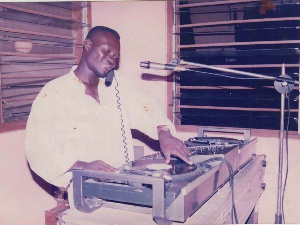Marathon D.J. sets are a staple of electronic music culture. From Berlin clubs to Bushwick loft parties, headlining D.J.s sometimes spend three, six or even eight hours behind the decks.
But these feats of song-selecting endurance pale compared with the typical weekly schedule of D.J. Katapila, a musician in Accra, the capital of Ghana, in West Africa.
Katapila, whose given name is Ishmael Abbey, earned his nickname — a reference to the construction equipment manufacturer Caterpillar — through his durability. Mr. Abbey is a longtime veteran of spinning funeral parties in Ghana, where mobile D.J. crews play to massive crowds of dancers, often for the entire weekend.
“They call me Katapila because I can stand on my feet for three days nonstop,” Mr. Abbey said over the phone from a pub in Mallam, an Accra suburb, where he was in the middle of a six-hour set on a recent Saturday night. (A colleague filled in on the turntables for the duration of the phone call.)
Mr. Abbey, 43, is a member of the Ga ethnic minority in Ghana, primarily concentrated in Accra, the country’s largest city, and Ga traditional rhythms inform his music. Last week, the Los Angeles-based label Awesome Tapes From Africa reissued Katapila’s 2009 debut album, “Trotro.” At times the music is breathlessly madcap: songs like “Cocoawra” and “Zoomlion” are dizzyingly fast, paced by cartoonishly sped-up voices (often belonging to Mr. Abbey’s daughter, then 4).
“Coastal area people like fast music,” Mr. Abbey said. “Sometimes when we play foreign songs we have to pitch it so people will dance to it.”
Slightly slower, the instrumentals on “Trotro” resemble more familiar dance music types: “Lalokat” echoes the stripped-down metallic bounce of early Chicago acid house, while “Ice-Inc” recalls the raw, dark minimalism of the Detroit house producer Omar-S.
“What I know about house music is it’s very danceable, it’s very kicking,” Mr. Abbey said. “Even cat or dog can listen to that song and can just feel it, can understand whatever is in that song because there’s no voice.”
Mr. Abbey first began working as a D.J. when he was 15. Short at the time, he had to stand on crates just to reach the turntables, and while his stature has grown, his set lists remain influenced by late-1980s house music.
On a D.J. mix from December 2014 posted to Soundcloud, for instance, Mr. Abbey can be heard singing in Ga over “Big Fun” by the Detroit techno group Inner City and tapping out Yamaha electronic drum pad beats along to hits by C+C Music Factory, Crystal Waters and Rick Astley.
“He’s inspired by the radio,” said Brian Shimkovitz, the founder of Awesome Tapes From Africa, “the stuff that was playing on Hot 97 20 years ago.”
Mr. Abbey didn’t start creating his own music until he was in his mid-30s, when a friend installed a free trial version of the music-production software FruityLoops on his computer.
Mr. Shimkovitz first encountered Katapila’s music last spring, while shopping for cassettes in the Ghanaian city Kumasi. Ever since he first visited Ghana in 2002 as a student working on an ethnomusicology degree, Mr. Shimkovitz has been an avid collector of locally produced African music cassettes, turning his passion into a popular music blog in 2006 and a record label in 2011. Mr. Shimkovitz found two bootleg tapes of Katapila’s music, including “Trotro,” and began trying to track the musician down immediately.
“I was really excited because it reminded me of the kind of electronic music we like back home, Chicago- and Detroit-type stuff,” Mr. Shimkovitz said. On closer listen, however, Mr. Shimkovitz said he realized that Mr. Abbey’s music was full of “bell patterns, drum patterns, clap patterns and vocalizing that are all total one-to-one connections with Ga dance music.”
Mr. Shimkovitz said that Mr. Abbey stood out among his Ghanaian peers, most of whom play soukous-influenced Francophone club music or the highlife-derived local hip-hop known as hiplife. “In the context of Ghana,” Mr. Shimkovitz said, “where electronic music in the form of dance music like house or techno has never had a foothold, it’s quite interesting that there’s something that sounds like that being made there.”
Potential tours of European and Asian clubs and festivals are being considered, a long way from the D.J.’s funeral party roots, but Mr. Abbey is eager for the opportunity. “Everybody loves music, even snakes love music,” Mr. Abbey said. “I would like the world to know that there is a D.J. called Katapila who can make people happy.”
Entertainment of Sunday, 11 December 2016
Source: nytimes.com













